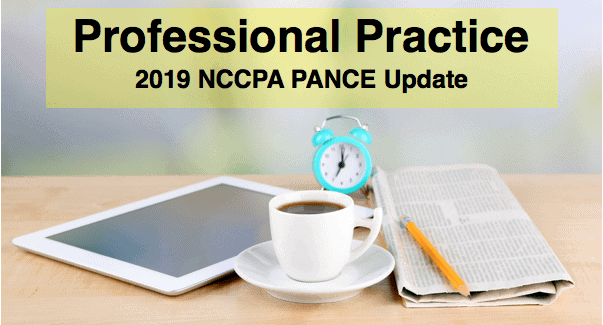Professional Practice and PANCE Updates

The 2019 NCCPA Content Blueprint by Task Area now contains the task Professional Practice. Many PA schools and students are concerned about not having material to review and learn for the updated version of the PANCE.
Now included in the Rosh Review PANCE Qbank is a section dedicated to Professional Practice.
The Professional Practice section includes questions and comprehensive explanations on the following topics:
Legal/Medical Ethics
- Cultural and religious beliefs related to health care
- Informed consent and refusal process
- Living will, advance directives, organ donation, code status, do-not-resuscitate, do-not-intubate, medical power of attorney, etc.
- Medicolegal issues
- Patient/provider rights and responsibilities
- Privacy, security, and responsibility related to medical record documentation and management
- Caring for patients with cognitive impairment
Medical Informatics
- Billing/coding to maintain accuracy and completeness for reimbursement and administrative purposes
- Demonstrating appropriate medical record documentation
- Using appropriate medical informatics sources
Patient Care and Communication (individual patients)
- Affordable and effective health care that is patient specific
- Cultural and religious diversity
- Stewardship of patient and community resources
- Acknowledging and applying patient/provider rights and responsibilities
- Ensuring patient satisfaction
- Providing patient advice and education regarding the informed consent and refusal process
- Providing patient advice and education related to end-of-life decisions
Physician/PA Relationship
- Professional and clinical limitations, scope of practice, etc.
- Supervision parameters: malpractice, mandated reporting, conflict of interest, impaired provider, ethical principles
- Communicating and consulting with the supervising physician and/or other specialists/consultants
Professional Development
- Continuing medical education resources
- Critically analyzing evidence-based medicine
- Identifying and interpreting data from medical informatics sources and identifying appropriate reference sources
- Using epidemiological techniques to evaluate the spread of disease
Public Health (population/society)
- Basic disaster preparedness
- Infection control measures and response to outbreaks
- Occupational health issues as they pertain to health care as well as non–health care workers
- Population health, travel health, and epidemiology of disease states
- Protecting vulnerable populations and recognizing disparities in provision of and access to health care
Risk Management
- Quality improvement and patient safety
- Resource stewardship
- Ensuring patient safety and avoiding medical errors
Here is a sample question
What is the primary determinant of the physician assistant’s scope of practice in most states?
A) Individual physician assistant experience, abilities, and education
B) National Commission on Certification of Physician Assistants
C) State laws
D) Supervising physician at the practice site
Answer D
Explanation
The physician assistant, by nature, is a profession dependent on the supervisory authority of physicians. According to the American Medical Association (AMA), 47 states dictate that the scope of practice for the physician assistant is determined by the supervising physician at the practice site. Physician groups and other licensed healthcare facilities such as hospitals, nursing homes, and surgery centers can also determine the specific responsibilities and limitations of physician assistants that operate under their supervision. Many states also have other parameters which generally limit the PA’s scope of practice. Some of these include the requirement of a co-signature on PA charts by the supervising physician, ratio limitations establishing the maximum number of PAs a physician can supervise, and designating prescriptive authority. Most states specify that the supervisory role of the physician includes being available for consultation at all times, although not necessarily physically present during each delegated task of the PA. The AMA believes that the supervising physician retains ultimate responsibility for patient care and therefore opposes regulations that allow PAs to make independent medical judgments. On the other hand, the American Academy of Physician Assistants (AAPA) states that, because research has consistently shown that PA-provided care is high-quality and safe, individual PA scope of practice can safely be determined at the practice level. AAPA contends that as states recognize how valuable PAs are to the healthcare team, they are broadening laws which enable PAs to diagnose, treat, prescribe, and manage a wide range of medical conditions without needing to submit detailed practice descriptions to regulators.
The American Academy of Physician Assistants (AAPA) states that the boundaries of each physician assistant’s scope of practice are determined by several factors, including the individual physician assistant’s experience, abilities, and education (A) is incorrect. While this does contribute to the responsibilities given to each physician assistant in their particular role, the majority of state laws assert that it is the individual supervising physician who has the capacity to determine these responsibilities. The National Commission on Certification of Physician Assistants (B) is the certifying organization for physician assistants, established to ensure that PAs meet standards of clinical knowledge and cognitive skills throughout their careers. They have no legal authority to determine the PA scope of practice. State laws (C), in general, have mandated that it is up to the supervising physician or entity to specify what a PA can, and cannot, do. This broad statement gives the supervising physician the right to evaluate the individual PA’s skills and clinical knowledge in order to specify the scope of practice that is appropriate.
For more Professional Practice, sign up for Rosh Review’s PANCE Qbank. And if you are a program director wanting to know more about partnering with Rosh Review at your PA school, you can contact us here for more information.





Comments (0)